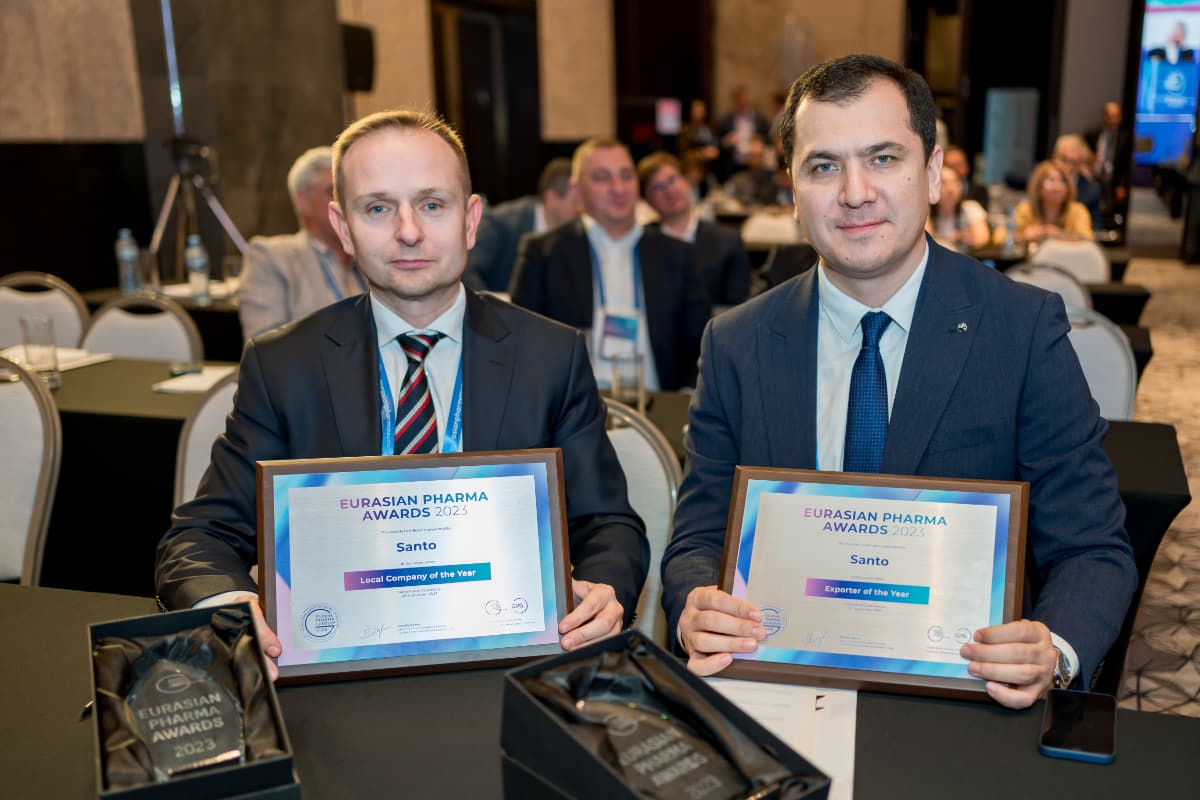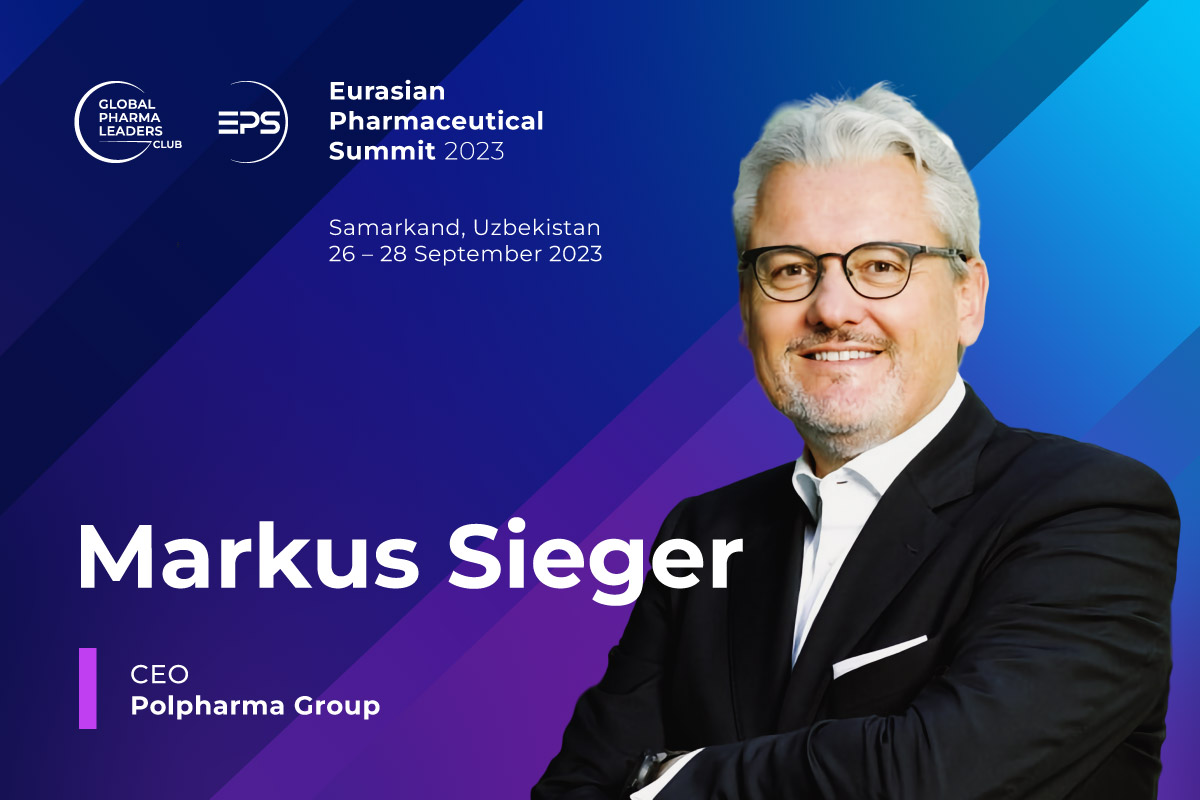Markus Sieger, CEO of Polpharma Group in an exclusive interview with the Global Pharmaceutical Leaders’ Club discussed priorities and prospects for the company’s development in the Eurasia region and regulatory changes that have the greatest impact on the development of the pharmaceutical markets in the countries of Central Asia, the Caucasus and Eastern Europe.
SANTO, a member of Polpharma Group, is one of the leaders in the pharmaceutical markets of the Eurasian region. Due to its cutting-edge technology and unique expertise, the company has earned a reputation of the innovation leader with global influence.
What are the priorities for your company in the Eurasia region?
SANTO is the leading pharmaceutical manufacturer in Central Asia and part of the European group of companies Polpharma, which produces effective, safe and affordable pharmaceutical drugs for the treatment of diseases in 12 pharmacotherapeutic groups. All production and warehousing of the company has GMP certificates of the EAEU and the Republic of Kazakhstan. Our R&D laboratory is one of the best in Central Asia. It develops various types of medicines and implements research programs. This is the unique feature of SANTO among other pharmaceutical companies as we do not do a simple technology transfer, we not only import, but also develop our own generic medicines.
The priority of SANTO is to expand the portfolio of medicines, considering the needs of local markets, increasing its presence in the following countries: Uzbekistan, Kyrgyzstan, Mongolia, Turkmenistan, Tajikistan, Afghanistan and others. Our experts have a clear understanding of the demand for medicines of various forms and dosages and make every effort to meet the needs of the healthcare systems.
We have initiated the “GO WEST!” project aimed at developing a Central Asian pharmaceutical hub out of Shymkent creating a contemporary R&D and quality control center and passing the European Union inspection to obtain a GMP certificate for our production site. With this certificate the company plans to start exporting its medicines to the EU countries.
What trends having the most impact on pharmaceutical markets in the countries of the Eurasian region do you highlight for your company?
After the pandemic, people began to realize that health is the most important and valuable for each of us. Therefore, more and more people want to switch to a healthy lifestyle. In this vein, our goal is to help them stay healthy for as long as possible and prevent the development of diseases. People’s immune systems have weakened, so we began to produce more nutritional supplements, vitamins and other products that help a person maintain good health and prevent diseases. This is the first trend to which we respond.
Basically, we see an increasing demand for medicines, which is the second trend. In the US and Germany, as you know, 80% of medicines are generics. In our company, we also produce mainly generics. As a firm rule, they are less expensive and more accessible to the population. Therefore, we believe that the expansion of the production of such drugs in Kazakhstan will allow more people to receive the necessary quality treatment in the countries of Central Asia.
We believe that generic medicine is the best solution for healthcare providers, as the Central Asian countries have a limited amount of funds to spend on medicines. The need and use of medicines is constantly growing in so called emerging markets. With the development of the health insurance system in the countries of our region the pharma markets will increase both in volume and value of medicines. This creates opportunities to develop our portfolio and sales in the region.
As an example, over all these years we have invested about $108 million in SANTO, and by 2025 we will increase this figure to $130 million. Now we are finishing our project to develop a new R&D and testing center at the plant in Shymkent. There will be the most advanced technologies that meet European standards. This will be the first plant in Central Asia that will produce medicines according to European standards. We trust that countries of the region will move towards high quality GMP standard medicines as the base for their patients’ treatment.
What planned regulatory changes may affect the development of the pharmaceutical markets in the Eurasian region?
The region of Eurasia has been on the path of unification of the regulatory standards since January 2015.
The ambition than was to create one common regulatory system within the Eurasian Union which covered some of the countries of the region (Kazakhstan, Russia, Kyrgyzstan and Armenia). This effort has led to common regulatory requirements, common GMP standards and rules of circulation of medicines. One of key elements was to introduce the mutual recognition process in granting marketing authorizations which would be the advantage for manufacturers. This was only partially successful – the procedure does not work quite as expected.
This effort has resulted in some success and upgrade of registration dossiers and manufacturing processes. As not all the countries are part of Eurasian Economic Union, they develop their own regulatory pathways referring to EMA, ICH, FDA or have legacy system.
As an example: we see in Uzbekistan a trend to feature on EMA and ICH, but legal acts do not fully respect European regulations. Most recently in January Uzbekistan has introduced new registration principles which penalizes European manufacturers who are not on the Waiver List.
This list was compiled incorrectly; not all European countries with production facilities that fully comply with the requirements of European standards were included in it. This indicates the imperfection of existing legal acts.
This affect EU manufacturers like Polpharma that will experience the delays in introducing new products to UZ market and market will experience out-of-stock situation for the patients. We are truly disappointed with this regulatory change. We believe that this type of regulatory changes limits the growth of the markets and reduces their attractiveness in the region. We hope that in the future we will be able to avoid such situations, because the good of the patient should come first.
 Eurasian Pharma Awards
Eurasian Pharma Awards
